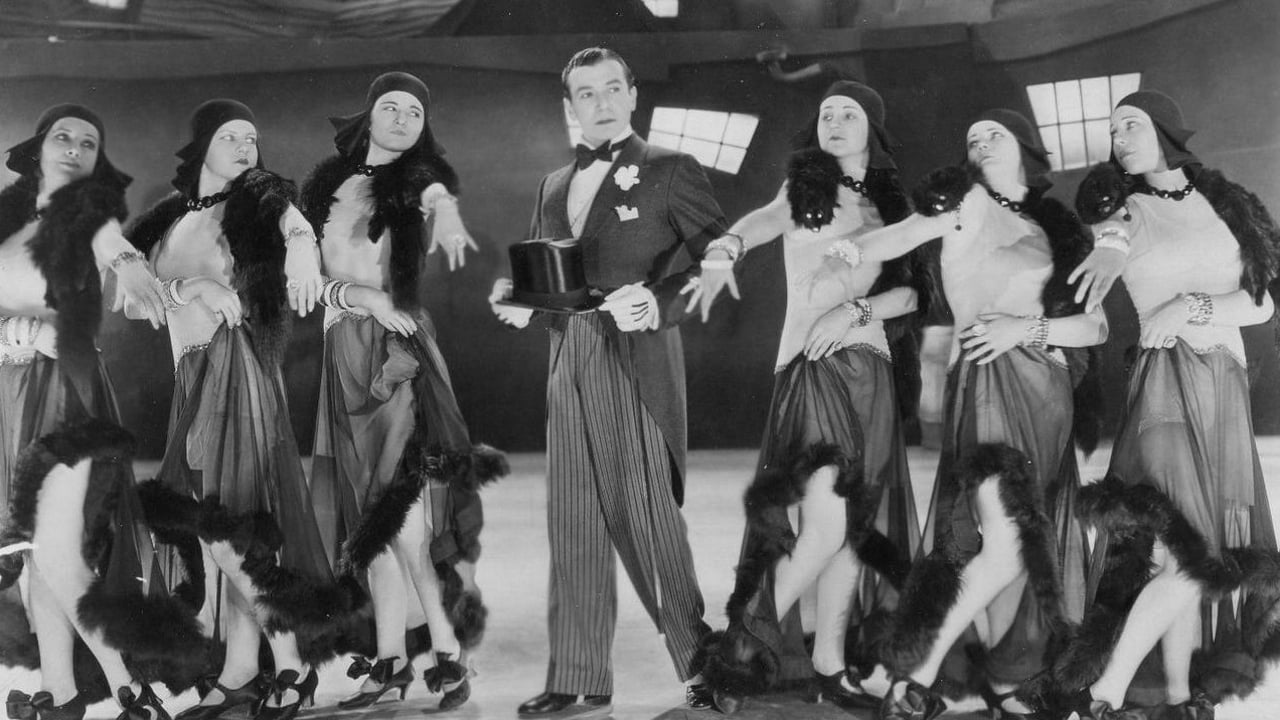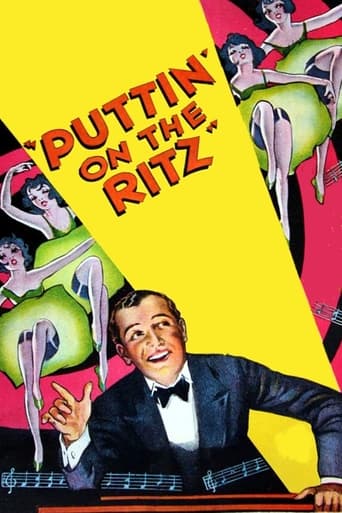

terrible... so disappointed.
... View MoreA movie that not only functions as a solid scarefest but a razor-sharp satire.
... View MoreIt's the kind of movie you'll want to see a second time with someone who hasn't seen it yet, to remember what it was like to watch it for the first time.
... View Morewhat a terribly boring film. I'm sorry but this is absolutely not deserving of best picture and will be forgotten quickly. Entertaining and engaging cinema? No. Nothing performances with flat faces and mistaking silence for subtlety.
... View MoreIn 1930 Irving Berlin was at a cross roads, his song writing talents which went back to the rag time era were now considered passé among the more sophisticated talents of Rodgers and Hart. He decided to sink or swim with movie songs - and one of the first was "Puttin' on the Ritz" with the song that became a standard. The man who was called upon to put it over was Harry Richman. He wasn't hugely well known away from the big city cabarets but at the time he was having a well publicized affair with Clara Bow and it was hoped that the scandal would bring in the public in droves.Just like Richman, his part of Harry Raymond was a conceited song and dance man who starts off as a song plugger. When lovely show girl Dolores Fenton (Joan Bennett) comes to the publishing house to try to interest people in a song she has written, "With You", Harry's over the top enthusiasm of it gets him fired. That's okay, he and Dolores team up with Jimmy (James Gleason) and Goldie (the wonderful Lilyan Tashman who acidly comments that Harry needs an 18 day diet for his fat head!!). Richman gets to put across "Singing a Vagabond Song", but his big headedness ("by the time I get through singing, you'll probably want me to sing all night") gets him into trouble again, especially when he invites the "beau-hunks" in the audience to come and have a sock at him if they dare!! Needless to say, that is the quartet's last night. They split up - Jimmie and Goldie go to the sticks, while Harry and Dolores dazzle the Great White Way - Dolores tries to give Harry a pep talk about being humble and not so much of the "I,I,I's and me, me, me's" but it falls on deaf ears. She also has to contend with fickle society dame (Aileen Pringle) who tells Harry all he wants to hear. Of course there is the scene where during a night club performance of "There's Danger in Your Eyes, Cherie" he completely ignores Dolores and sings only to Mrs. Van-Renssler!!Wonderful to see and hear Harry Richman put over "Puttin' on the Ritz" in a great production number that has strutting dancers, jiggling buildings and a glowing alley cat - knowing that this is the movie that introduced this standard!! Whatever you think of Richman, he had a powerful, almost sensual voice that sold songs. He and Dolores split up - no-one will touch Harry due to his ego but surprisingly Dolores (Bennett could neither sing or dance) is given the lead in "Alice in Wonderland". Would have been a stunning production in the original colour with the Tenniel characters coming to life on the stage. Joan Bennett couldn't have felt comfortable in the few musicals she was given at this time but her blonde looks were made to order for this sumptuous production number - as she skipped and danced with the Cheshire Cat, the Mad Hatter and the March Hare. At the end of the show the audience call for her to sing "With You" but she can't sing it without Harry. Where has Harry been? - Well he is now blind after drinking rotten liquor at his Christmas party but he makes Jimmy promise not to reveal his condition to Dolores. In a scene that had it's origins the year before when Al Jolson stood up in the audience of Ziegfeld's "Show Girl" and sang "Liza" as his wife Ruby Keeler danced on stage, Harry stands up and sings "With You" to a faltering Dolores.Apparently Joan Bennett said that when she began to sing a duet with Harry, he really blew his top and Irving Berlin had to step in and take her side. "Puttin' on the Ritz" was a huge movie hit in it's day with critics dubbing Richman the find of the year!! - but outside the cities audiences didn't care for the pushy Richman or his tabloid romances. After the initial success Richman was found not to live up to his hype and he went back to New York but in a scene that could have come from the movie, he was given a contract for some shorts only to have it taken away when he demanded too much!!Highly Recommended.
... View MoreThis was in production for quite a while before it was finally released in 1930 as a showcase for Broadway and nightclub star Harry Richman. He stars as a singer who teams up with blonde cutie Joan Bennett after he loses his job with a music publisher. Eventually they make it a foursome with his pal (James Gleason) and her former stage partner (Lilyan Tashman). They get discovered but the Broadway producer only wants Richman and Bennett.They become Broadway stars and he opens a swanky nightclub where he pals around with high society swells out for a thrill, especially one woman (Aileen Pringle). Bennett leaves him and goes on to solo stardom in a show that features an "Alice in Wonderland" number. Harry keeps on partying until he gets some bad liquor and goes blind. Will the society babe stick to him? Will Bennett come back? Richman sings a bunch of songs in his strong Broadway voice and is notable in the bizarre "Puttin; on the Ritz" productions number that features two groups of chorus dancers as well as swaying skyscrapers. This number as well as the "Alice" number were filmed as now-lost Technicolor sequences.The film was a hit at the box office, but Richman's ego scotched any real chances for film stardom.
... View MoreFor an early talkie musical, this one is actually pretty memorable even if it creaks as loudly as the stairs of "The Cat and the Canary". Crooner Harry Richman is a singer with a personality and ego as big as Jolson's and Joan Bennett is the young singer he falls in love with. If the story isn't close to Jolson's real-life with dancer Ruby Keeler, then I don't know what is. James Gleason is his hard-boiled but good hearted manager and offers some much needed humor. What is impressive here are the big musical numbers, very similar to those of MGM's big budget smash "Broadway Melody" the same year (when it won an Academy Award for Best Picture), the standouts being the title song (sung here on screen for the first time before Clark Gable, Fred Astaire and Dr. Frankenstein and his monster laid into it) and the "Alice in Wonderland" spoof which almost seems like a live-action cartoon. Richman's personality may not appeal to modern audiences, but at one time, he was as big as Jolson. This is a difficult film to rate as a majority of the print is missing and what remains is choppy at best. Still a curiosity for movie musical buffs, it is worth a look for an era of film long gone. The Jolson/Keeler story was also "fictionally" dramatized in 1933's "Broadway Through a Keyhole", another lavish musical influenced more by the release of "42nd Street" in which Keeler went out a youngster but came back a star.
... View MoreSince _Movie Mirror_ did a fine job of outlining the movie, I won't go into the plot too much. But there are some odd bits I'd like to comment on:Everything seems to happen quickly in this movie, with the characters' lives changing every few scenes. Harry and Dolores get engaged to each other almost immediately. Harry instantly becomes a star, and wastes no time in starting up his own restaurant/club. Then, before you know it, he goes blind from some bad whisky. Ahh, to be amongst the beautiful people...The stage sets in the bigger production numbers are beautiful, especially during the title song, where the backdrop of bobbing buildings is quite surreal. Just imagine what it would have been like, to be in the audience at that moment.Overall, it's fairly easy to tell that this is an early talkie movie. The actress playing Dolores occasionally looks like she's acting in silent pictures. The shallow plot is strung out by a bad case of "excessive musical number-itis". And Harry's voice becomes increasingly difficult to tolerate/take seriously. But it's a good time, and an interesting point in the history of cinema.
... View More